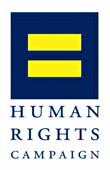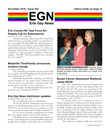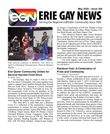State of LGBTQ Equality in 10 Pennsylvania Cities Detailed in HRC's 5th Edition of the Municipal Equality Index
Many municipalities extend vital protections to their LGBTQ citizens and employees
WASHINGTON - October 17, 2016 - Today, the Human Rights Campaign (HRC) Foundation, the educational arm of the nation's largest lesbian, gay, bisexual, transgender and queer (LGBTQ) civil rights organization, in partnership with the Equality Federation Institute, released its fifth annual Municipal Equality Index (MEI), assessing LGBTQ equality in 506 cities across the nation, including 10 in Pennsylvania.
The 2016 Municipal Equality Index (MEI), the only nationwide rating system of LGBTQ inclusion in municipal law and policy, shows that cities across the country, including in Pennsylvania, continue to take the lead in supporting LGBTQ people and workers, even when states and the federal government have not.
For LGBTQ Americans, legal protections and benefits vary widely depending on location -- states and cities have markedly different laws governing discrimination. 20 states have non-discrimination laws that include protections for LGBTQ people in employment, and 19 states have laws that protect LGBTQ people from discrimination in places of public accommodation. But cities are leading the way: more than 24 million people live in cities that have more comprehensive laws for transgender people than the states do. And that's an important part of how 135 million Americans -- 42 percent of the population -- are covered under LGBTQ-inclusive non-discrimination laws. The effort to achieve full equality continues, and the MEI remains a crucial tool in evaluating the patchwork of LGBTQ policies and practices in cities and towns across the nation.
The average score for cities in Pennsylvania is 70 out of 100 points, which falls above the national average of 55.
|
City |
State |
Score |
|
Philadelphia |
Pennsylvania |
100 |
|
Allentown |
Pennsylvania |
95 |
|
Pittsburgh |
Pennsylvania |
93 |
|
New Hope |
Pennsylvania |
80 |
|
State College |
Pennsylvania |
72 |
|
Harrisburg |
Pennsylvania |
68 |
|
Reading |
Pennsylvania |
66 |
|
Wilkes-Barre |
Pennsylvania |
62 |
|
Erie |
Pennsylvania |
39 |
|
Carlisle |
Pennsylvania |
26 |
"This year, dozens of cities across the nation showed they are willing to stand up for LGBTQ people in their communities even when some state governments are not, " said HRC President Chad Griffin. "This builds on a trend we have long observed: that local governments are at the forefront of our fight for equality. Unfortunately, our opponents have witnessed this progress too, and in recent years, anti-LGBTQ lawmakers have pushed spiteful legislation aimed at pre-empting local protections. That's why it's so important that we continue to not only fight for equality at the state and local levels, but to enact comprehensive federal protections for LGBTQ people under the Equality Act. "
"Despite another year of legislative attacks on LGBTQ equality, we are not merely holding our ground; we also continue to make significant gains across the country, " said Rebecca Isaacs, Executive Director of the Equality Federation Institute. "The opportunity for further progress is huge, and we are proud to partner with HRC on the Municipal Equality Index, a powerful roadmap for elected officials and community advocates who want to continue down the path to full equality. "
"Municipalities in Pennsylvania lead the way on equality for LGBT people in our state. Specifically, Pennsylvania now has 37 municipalities that protect LGBT people from discrimination,"" said Ted Martin, Executive Director of Equality PA. ""However, more than two-thirds of the LGBT population in Pennsylvania remains unprotected from discrimination in the workplace, in housing, and in business and government services. We hope the state will follow the lead of municipalities and update our statewide laws to protect everyone from discrimination. "
Since the MEI's debut in 2012, the number of cities earning perfect scores has more than quintupled, and today at least 24 million people now live in cities that have more comprehensive, transgender-inclusive non-discrimination laws than their state or the federal government. And cities that have been rated all five years of the MEI have improved their scores by about 20 points over that time.
Progress on transgender equality has been particularly noteworthy in cities across America this year, continuing a positive trend that the MEI has tracked -- and encouraged -- since 2012. Transgender-inclusive healthcare benefits are offered to employees of 86 municipalities this year -- up from 66 in 2015 and 5 in 2012 -- and the growth of cities offering those benefits to their employees outpaces the growth in the number of cities rated. The MEI's Issue Brief on Transgender-Inclusive Health Benefits is available here.
For the first time this year, the MEI deducted points from the scores of cities that have non-discrimination protections containing carve-outs prohibiting individuals from using public facilities consistent with their gender identity. It also created a new category of points to recognize cities that are offering transgender-specific city services.
Two special reports are also included in the 2016 MEI: Power Struggles and Preemption details efforts by anti-equality officials at the state level to pass discriminatory legislation like North Carolina's HB2 law that strip municipalities of their ability to protect their residents and workers with non-discrimination measures. Inclusive and Innovative Approaches to Citywide Bullying Prevention lays out the serious public health issue of bullying, how it disproportionately affects LGBTQ youth, and innovative ways municipalities can protect its young people from bullying. The 2018 MEI will change the way it assesses anti-bullying issues, as described in this brief.
Other key findings from the 2016 Municipal Equality Index include:
- 87 cities from states without nondiscrimination laws protecting LGBTQ people scored above the overall nationwide mean of 55 points. These cities averaged 80-point scores; 22 scored a perfect 100.
- Cities continue to excel even in the absence of state laws: 37 "All Star " cities in states lacking comprehensive non-discrimination laws scored above 85 points, up from 31 last year, 15 in 2014, eight in 2013, and just two in 2012.
- The average city score was 55 points. 60 cities, or 12 percent of those rated, scored 100 points; 25 percent scored over 75 points; 25 percent scored under 33 points; and 8 cities scored zero points.
- Cities with a higher proportion of same-sex couples, as tabulated by a UCLA Williams Institute analysis of the 2010 U.S. Census, tended to score better. The presence of openly-LGBTQ city officials was also correlated with higher scores.
The MEI rated 506 cities: the 50 state capitals, the 200 largest cities in the United States, the five largest cities or municipalities in each state, the cities home to the state's two largest public universities (including undergraduate and graduate enrollment), 75 cities and municipalities that have high proportions of same-sex couples, and 98 cities selected by members and supporters of HRC and Equality Federation state organizations.
The MEI rates cities based on 44 criteria that fall into five broad categories:
- Non-discrimination laws
- Municipal employment policies, including transgender-inclusive insurance coverage and non-discrimination requirements for contractors
- Inclusiveness of city services
- Law enforcement, including hate crimes reporting
- Municipal leadership on matters of equality
The full report, including detailed scorecards for every city, as well as a searchable database, is available online at www.hrc.org/mei.
The Human Rights Campaign Foundation is the educational arm of America's largest civil rights organization working to achieve equality for lesbian, gay, bisexual transgender and queer people. HRC envisions a world where LGBTQ people are embraced as full members of society at home, at work and in every community.



